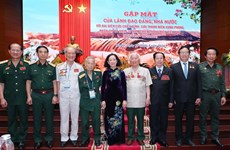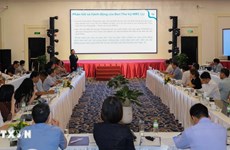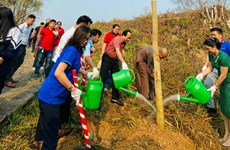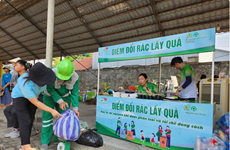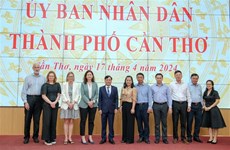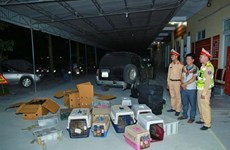Mekong needs bio-diversity preservation
The Cuu Long ( Mekong ) Delta is in desperate need of an adaptable
environmental policy in order to cope with current decreasing biological
diversity and declining natural resources.
The Cuu Long ( Mekong ) Delta is in desperate need of an adaptable
environmental policy in order to cope with current decreasing biological
diversity and declining natural resources.
"Investment in biological preservation equates to investment in the future. The environmental protection policy has to be current with development trends in the region," said Bui Ngoc Suong, deputy head of the Southwestern Steering Committee, at the recent third Natural and Cultural Conservation Forum for Cuu Long (Mekong) Delta Sustainable Development in the southern province of Ben Tre .
Around 200 delegates from 13 regional provinces, universities, research institutes and foreign organisations participated in the forum, co-hosted by the World Wide Fund for Nature (WWF) and the Ben Tre People's Committee in celebration of World Environment Day on June 5.
The "Adaptive Management in Coping with Climate Change" forum included talks on the impact of climate change, hydropower development, the preservation of nature, economic development and practical models on adaptive management aimed at increasing awareness amongst policy makers, authorities and residents regarding the importance of biological preservation.
"We need long-term strategies and the participation of relevant authorities, partners and people in order to cope with climate change," said Dr Nguyen Hong Tri, general secretary of the Vietnam National Committee for Man and Biosphere.
Tri pointed out that the impact of climate change in the region has caused a lot of uncertainty.
"We have to change our vision and methods in dealing with international issues by applying new adaptive management strategies," he added.
Adaptive management involves a systematic process of developing knowledge and continually improving project development by learning from previous projects and their outcomes. It brings together a scale of practice, science and governance that allows learning through continual involvement in various disciplines.
"Setting up a Biosphere Reserve Zone would be an effective measure in coping with climate change by conserving biodiversity as well as cultural and traditional values," Tri said.
Although the delta is a famous wetland ecosystem, it has suffered from economic development both upstream and downstream as well as a shortage of water.
"Implementing environmental protection strategies, allowing the ecosystem to recover, creating natural reserve zones and issuing a regional development master plan is essential in saving the Cuu Long Delta," said Vo Tri Chung from the Environment and Sustainable Development Institute.
Delegates suggested that Vietnam cooperate with Africa in order to produce rice with the aim of ensuring national food security and the reduction of pressure on agricultural production throughout the Delta area.
Organisers confirmed the positive results from last year's event towards better protecting the Delta area.
According to the United Nations Development Programme, the delta will be amongst the three most affected delta areas in the world in terms of climate change and rising sea levels.
It has been predicted that, up until 2075, around 11 percent of the delta will lose ground as sea levels rise by 50cm. /.
"Investment in biological preservation equates to investment in the future. The environmental protection policy has to be current with development trends in the region," said Bui Ngoc Suong, deputy head of the Southwestern Steering Committee, at the recent third Natural and Cultural Conservation Forum for Cuu Long (Mekong) Delta Sustainable Development in the southern province of Ben Tre .
Around 200 delegates from 13 regional provinces, universities, research institutes and foreign organisations participated in the forum, co-hosted by the World Wide Fund for Nature (WWF) and the Ben Tre People's Committee in celebration of World Environment Day on June 5.
The "Adaptive Management in Coping with Climate Change" forum included talks on the impact of climate change, hydropower development, the preservation of nature, economic development and practical models on adaptive management aimed at increasing awareness amongst policy makers, authorities and residents regarding the importance of biological preservation.
"We need long-term strategies and the participation of relevant authorities, partners and people in order to cope with climate change," said Dr Nguyen Hong Tri, general secretary of the Vietnam National Committee for Man and Biosphere.
Tri pointed out that the impact of climate change in the region has caused a lot of uncertainty.
"We have to change our vision and methods in dealing with international issues by applying new adaptive management strategies," he added.
Adaptive management involves a systematic process of developing knowledge and continually improving project development by learning from previous projects and their outcomes. It brings together a scale of practice, science and governance that allows learning through continual involvement in various disciplines.
"Setting up a Biosphere Reserve Zone would be an effective measure in coping with climate change by conserving biodiversity as well as cultural and traditional values," Tri said.
Although the delta is a famous wetland ecosystem, it has suffered from economic development both upstream and downstream as well as a shortage of water.
"Implementing environmental protection strategies, allowing the ecosystem to recover, creating natural reserve zones and issuing a regional development master plan is essential in saving the Cuu Long Delta," said Vo Tri Chung from the Environment and Sustainable Development Institute.
Delegates suggested that Vietnam cooperate with Africa in order to produce rice with the aim of ensuring national food security and the reduction of pressure on agricultural production throughout the Delta area.
Organisers confirmed the positive results from last year's event towards better protecting the Delta area.
According to the United Nations Development Programme, the delta will be amongst the three most affected delta areas in the world in terms of climate change and rising sea levels.
It has been predicted that, up until 2075, around 11 percent of the delta will lose ground as sea levels rise by 50cm. /.








